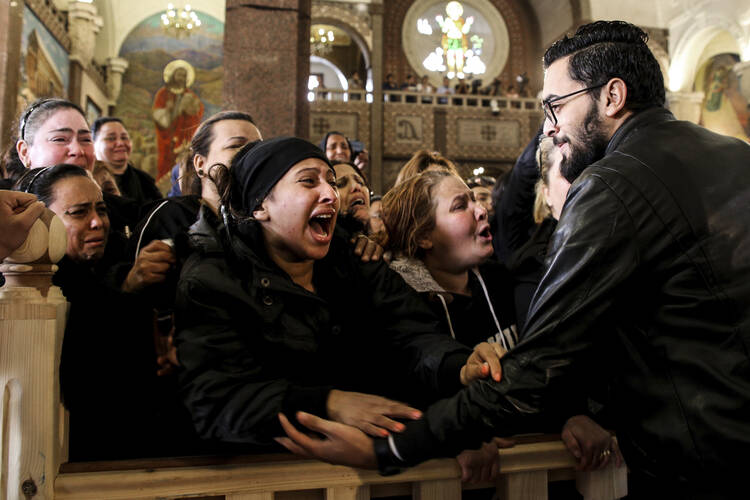Egyptian Christians were burying their dead on Monday after Islamic State suicide bombers killed at least 45 people in attacks on Palm Sunday services in two cities, as a state of emergency went into effect amid fears of further violence.
Women wailed as caskets marked with the word "martyr" were brought into the St. Mina monastery in the outskirts of the coastal city of Alexandria, the footage broadcast on several Egyptian channels. Coptic priests, boy scouts, and mourners carrying flowers joined a procession into the church, the pace set by a beat of snare drums.
At least 17 people were killed at St. Mark's Cathedral in Alexandria, the historic seat of Christendom in Egypt. Another suicide attack killed at least 28 people inside St. George's Church in the Nile Delta city of Tanta, the Health Ministry said, updating an earlier toll. IS claimed both bombings.
Rev. Danial Maher, of the Tanta church, lost his 23-year-old son, Beshoy, who was among six deacons killed in the attack. He recalled watching his son wearing white vestments and singing at the service. "He was like an angel," he said.
Pictures of the elder Maher, sitting helplessly in blood-stained vestments after the attack, were widely circulated online. He buried his son late Sunday.
Pictures of the elder Maher, sitting helplessly in blood-stained vestments after the attack, were widely circulated online.
The attacks led President Abdel-Fattah el-Sissi to declare a state of emergency, amid fears that IS militants, who have been battling security forces in the Sinai Peninsula for years, are shifting their focus to Egypt's Coptic minority, one of the oldest Christian communities in the world. In December, a massive church bombing killed 30 people in Cairo, and a series of killings in the Sinai have caused hundreds to flee to safer areas.
The rising violence has undermined the Egyptian government's claim to being a bulwark against extremism in a chaotic region as it pursues closer ties with President Donald Trump, who hosted el-Sissi at the White House a week ago.
The parliament has seven days to approve or reject the state of emergency, but its approval is seen as a foregone conclusion since the legislature is packed with el-Sissi's supporters. The Cabinet declared that it had gone into effect at 1 p.m. (1100 GMT).
In theory, it would allow for arrests without warrants, swifter prosecution of suspects, and special courts. But authorities have already been waging a heavy crackdown on dissent for years, so it was unclear if anything would change.
"We won't see a change on the ground, as this decision wasn't taken to give more powers or tighten control," said political analyst Yasser Abdel-Aziz. "It's a purely political decision that is meant to have a psychological impact."
El-Sissi has clamped down on opponents since he led the military overthrow of an elected Islamist president, Mohammed Morsi, in 2013. Thousands of people have been jailed, mainly Morsi supporters but also several prominent secular and liberal activists.
"The powers that the security agencies have already don't need reinforcement by the state of emergency," Abdel-Aziz said. "The status quo of media and press freedoms is ideal for the security authorities to work without much noise."
The Palm Sunday attacks, the single deadliest day for Egypt's Christians in decades, rattled the community and prompted messages of support from abroad, including from Pope Francis, who is set to visit Egypt in the coming weeks, and President Donald Trump.
Israel meanwhile closed its Taba border crossing to Egypt after its anti-terrorism office warned of an "imminent" militant attack there, underlining fears of more violence. The closure comes hours before the start of the Passover holiday.
Southern Sinai, which has seen little of the violence plaguing the northern part of the peninsula, is a popular tourist destination.
Soon after the announcement, sirens wailed in parts of southern Israel alerting residents to a rocket attack. The military said a rocket fired from Sinai struck a greenhouse but caused no injuries. IS claimed responsibility for the attack.
Copyright 2017 The Associated Press. All rights reserved. This material may not be published, broadcast, rewritten or redistributed.










